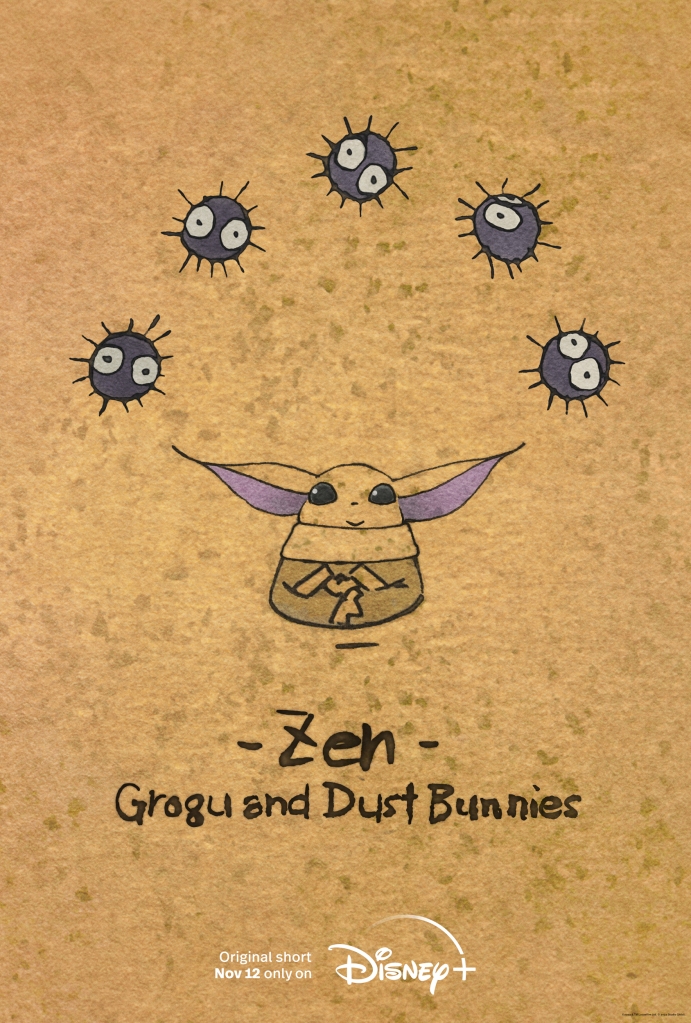Studio Ghibli has cooked up something sweet with Lucasfilm and Walt Disney Co.
It was announced Friday evening that Ghibli director Katsuya Kondo has helmed the hand-drawn short “Zen – Grogu and Dust Bunnies” to debut Saturday November 12 on Disney+ in celebration of the third anniversary of Disney+ and the popular “Star Wars” series “The Mandalorian.”
The famed Japanese animation studio had tweeted the Lucasfilm logo earlier in the week indicating that a collaboration was in the works. It was a message amplified by at least one Disney executive. Walt Disney Pictures’ President of Marketing Asad Ayaz retweeted the Studio Ghibli post with a hinting eyes emoji.
Studio Ghibli is best known for producing films like “KiKi’s Delivery Service,” “Princess Mononoke,” and “Spirited Away.” The production company’s most recent film was “Earwig and the Witch,” released in 2020.
There is precedent for such a collaboration here too: Lucasfilm, the creators behind the “Star Wars” franchise, has collaborated with Japanese animators to bring anime aesthetics to the Disney+ series “Star Wars: Visions.” Lucasfilm partnered with seven anime studios to create nine short films set in the “Star Wars” galaxy.
“The goal with ‘Visions’ was always that we wanted this to be authentic Japanese anime,” executive producer James Waugh told The Hollywood Reporter in 2021. “We wanted it to be a true expression from these individual creators in a process that they’re used to. The last thing we wanted to do was be a Western studio that went with our ideas and then really leaned on them for their aesthetic. They were creating stories and concepts that could only come from their unique cultural perspective.”
Waugh credited Lucasfilm president Kathleen Kennedy for being “very instrumental” in bringing Studio Ghibli co-founder Hayao Miyazaki’s work stateside.
As for other upcoming “Star Wars” feature films, Oscar winner Taika Waititi is helming a new franchise installment that will “expand” the scope of “Star Wars” and introduce entirely new characters. “Deadpool” director Shawn Levy is also in talks to direct a “Star Wars” film for Disney and Lucasfilm. “Wonder Woman” helmer Patty Jenkins is additionally attached to another “Star Wars” feature film with an undetermined release date.
The “Star Wars” series on Disney+ are further expanding with live-action “Ahsoka” starring Rosario Dawson, Mary Elizabeth Winstead, and Hayden Christensen. Jude Law makes his franchise debut with “Skeleton Crew,” directed by Marvel helmer Jon Watts. “Russian Doll” co-creator Leslye Headland is behind “The Acolyte,” with a star-studded ensemble cast including “Matrix” icon Carrie-Anne Moss, “Squid Game” Emmy winner Lee Jung-jae, Jodie Turner-Smith, Amandla Stenberg, Manny Jacinto, and Charlie Barnett.

It was announced Friday evening that Ghibli director Katsuya Kondo has helmed the hand-drawn short “Zen – Grogu and Dust Bunnies” to debut Saturday November 12 on Disney+ in celebration of the third anniversary of Disney+ and the popular “Star Wars” series “The Mandalorian.”
The famed Japanese animation studio had tweeted the Lucasfilm logo earlier in the week indicating that a collaboration was in the works. It was a message amplified by at least one Disney executive. Walt Disney Pictures’ President of Marketing Asad Ayaz retweeted the Studio Ghibli post with a hinting eyes emoji.
Studio Ghibli is best known for producing films like “KiKi’s Delivery Service,” “Princess Mononoke,” and “Spirited Away.” The production company’s most recent film was “Earwig and the Witch,” released in 2020.
There is precedent for such a collaboration here too: Lucasfilm, the creators behind the “Star Wars” franchise, has collaborated with Japanese animators to bring anime aesthetics to the Disney+ series “Star Wars: Visions.” Lucasfilm partnered with seven anime studios to create nine short films set in the “Star Wars” galaxy.
“The goal with ‘Visions’ was always that we wanted this to be authentic Japanese anime,” executive producer James Waugh told The Hollywood Reporter in 2021. “We wanted it to be a true expression from these individual creators in a process that they’re used to. The last thing we wanted to do was be a Western studio that went with our ideas and then really leaned on them for their aesthetic. They were creating stories and concepts that could only come from their unique cultural perspective.”
Waugh credited Lucasfilm president Kathleen Kennedy for being “very instrumental” in bringing Studio Ghibli co-founder Hayao Miyazaki’s work stateside.
As for other upcoming “Star Wars” feature films, Oscar winner Taika Waititi is helming a new franchise installment that will “expand” the scope of “Star Wars” and introduce entirely new characters. “Deadpool” director Shawn Levy is also in talks to direct a “Star Wars” film for Disney and Lucasfilm. “Wonder Woman” helmer Patty Jenkins is additionally attached to another “Star Wars” feature film with an undetermined release date.
The “Star Wars” series on Disney+ are further expanding with live-action “Ahsoka” starring Rosario Dawson, Mary Elizabeth Winstead, and Hayden Christensen. Jude Law makes his franchise debut with “Skeleton Crew,” directed by Marvel helmer Jon Watts. “Russian Doll” co-creator Leslye Headland is behind “The Acolyte,” with a star-studded ensemble cast including “Matrix” icon Carrie-Anne Moss, “Squid Game” Emmy winner Lee Jung-jae, Jodie Turner-Smith, Amandla Stenberg, Manny Jacinto, and Charlie Barnett.



